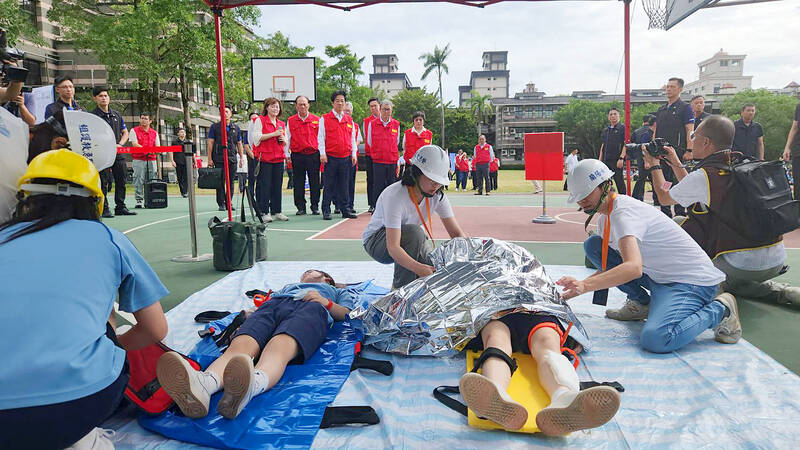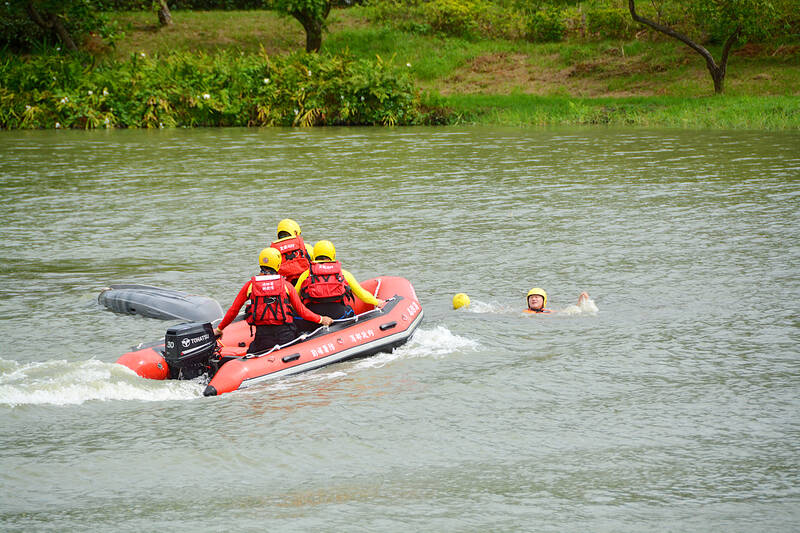Post-disaster restoration of telecom services should be as swift as the restorations of water and power supplies, President William Lai (賴清德) said as he observed disaster response drills in Yilan County yesterday.
Large-scale disaster relief drills simulating a tsunami triggered by an earthquake were held from Wednesday to yesterday in the county, with more than 1,300 people mobilized from the government, military, private businesses, non-governmental organizations and volunteer organizations.
Attendees included representatives of foreign missions in Taiwan and rescue personnel from 14 countries.

Photo: Yu Ming-chin, Taipei Times
All the drills used real-world locations and objects, and were conducted with an unscripted, semi-warning approach.
The drills simulated a tsunami caused by a magnitude 8.5 earthquake in the Ryukyu Trench, which struck the county’s Wuchieh (五結) and Jhuangwei (壯圍) townships 20 minutes later. The Yilan Sports Park (宜蘭運動公園) was the assembly point for rescue personnel.
Dozens of domestic search-and-rescue teams, along with those from the Philippines, Japan and the UK, headed to various locations, such as a quarry in Yuanshan Township (員山) or Formosa Chemicals and Fibre Corp’s (台灣化學纖維) plant at the Longte Industrial Park (龍德工業區), to carry out search-and-rescue operations.

Photo: Wang Chun-chi, Taipei Times
They not only rescued people trapped in rolled-over vehicles, but also destroyed actual buildings for search-and-rescue purposes.
Taiwan has experienced multiple disasters over the past few years, which have enhanced the public’s awareness of disaster prevention, Lai said.
The central and local governments collaborated to conduct the drills, aiming to minimize the harm from disasters and the time required for post-disaster reconstruction, he said, expressing thanks to the international community for helping Taiwan improve its disaster prevention and response capabilities.
The Whole-of-Society Defense Resilience Committee has been set up to bolster the nation’s resilience through collective efforts by people from different fields in Taiwan, Lai said.
He cited as an example a portable water purification system developed by the Buddhist Compassion Relief Tzu Chi Foundation, which could help with water demand during disasters.
As power outages caused by Typhoon Danas in Tainan and other areas disrupted telecom services in July, and the National Fire Agency has developed 5G networks jointly with the private sector, the restoration of telecom services after disasters should be stepped up in line with that of water and power supplies, Lai said.
The Ministry of National Defense’s Military Medicine Bureau has also integrated smart technologies jointly with the private sector to enable collaborations via online communications between battlefields and medical centers, he said.
The committee has commissioned the ministry to issue an all-out defense brochure that includes safety guidelines about typhoons, earthquakes and geopolitical emergencies, Lai said, adding that families would be given at least one copy.
Taiwan has achieved several milestones in disaster prevention infrastructure, such as the establishment of early warning systems for mobile phones and emergency alert systems on TVs, which help people know they need to take shelter within a short time, he said.
People are also advised to learn basic first aid skills, such as cardiopulmonary resuscitation or bandaging, to protect themselves and help others, Lai added.
Additional reporting by CNA

MAKING WAVES: China’s maritime militia could become a nontraditional threat in war, clogging up shipping lanes to prevent US or Japanese intervention, a report said About 1,900 Chinese ships flying flags of convenience and fishing vessels that participated in China’s military exercises around Taiwan last month and in January last year have been listed for monitoring, Coast Guard Administration (CGA) Deputy Director-General Hsieh Ching-chin (謝慶欽) said yesterday. Following amendments to the Commercial Port Act (商港法) and the Law of Ships (船舶法) last month, the CGA can designate possible berthing areas or deny ports of call for vessels suspected of loitering around areas where undersea cables can be accessed, Oceans Affairs Council Minister Kuan Bi-ling (管碧玲) said. The list of suspected ships, originally 300, had risen to about

DAREDEVIL: Honnold said it had always been a dream of his to climb Taipei 101, while a Netflix producer said the skyscraper was ‘a real icon of this country’ US climber Alex Honnold yesterday took on Taiwan’s tallest building, becoming the first person to scale Taipei 101 without a rope, harness or safety net. Hundreds of spectators gathered at the base of the 101-story skyscraper to watch Honnold, 40, embark on his daredevil feat, which was also broadcast live on Netflix. Dressed in a red T-shirt and yellow custom-made climbing shoes, Honnold swiftly moved up the southeast face of the glass and steel building. At one point, he stepped onto a platform midway up to wave down at fans and onlookers who were taking photos. People watching from inside

Japan’s strategic alliance with the US would collapse if Tokyo were to turn away from a conflict in Taiwan, Japanese Prime Minister Sanae Takaichi said yesterday, but distanced herself from previous comments that suggested a possible military response in such an event. Takaichi expressed her latest views on a nationally broadcast TV program late on Monday, where an opposition party leader criticized her for igniting tensions with China with the earlier remarks. Ties between Japan and China have sunk to the worst level in years after Takaichi said in November that a hypothetical Chinese attack on Taiwan could bring about a Japanese

The WHO ignored early COVID-19 warnings from Taiwan, US Deputy Secretary of Health and Human Services Jim O’Neill said on Friday, as part of justification for Washington withdrawing from the global health body. US Secretary of State Marco Rubio on Thursday said that the US was pulling out of the UN agency, as it failed to fulfill its responsibilities during the COVID-19 pandemic. The WHO “ignored early COVID warnings from Taiwan in 2019 by pretending Taiwan did not exist, O’Neill wrote on X on Friday, Taiwan time. “It ignored rigorous science and promoted lockdowns.” The US will “continue international coordination on infectious